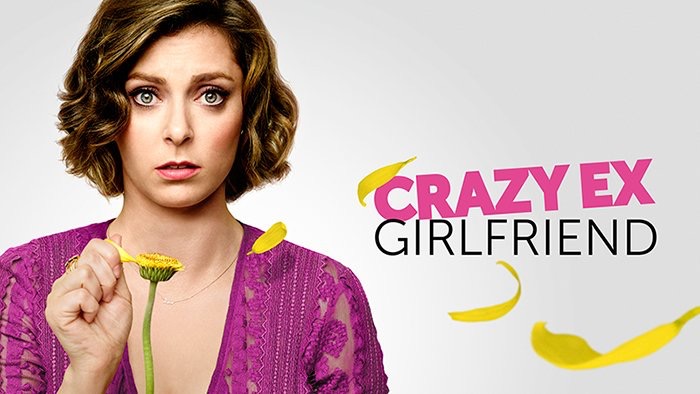Dr. Ryan Martin builds off his love of Crazy Ex-Girlfriend with seven other works about mental illness.
A few weeks ago, the show Crazy Ex-Girlfriend (on the CW) finished up its fourth and final season. If you aren’t familiar with this show, and you aren’t sure what to expect, I’ll tell you at the outset that it’s a (A) a romantic-comedy and (B) a musical about a woman struggling with (SPOILER ALERT) Borderline Personality Disorder. Ultimately, the reason that’s a spoiler is because her diagnosis isn’t revealed until season 3 with the following number (fair warning that you could easily lose a day watching YouTube performances from this show… and it would probably be one of the best days of your life):
There’s a lot to love about this show (and I spoke of that love on an episode of Psychology and Stuff last year). The musical numbers are brilliant. They are sometimes hilarious (see Face Your Fears) and sometimes quite touching and powerful (see The Darkness). The show is funny, entertaining, and it has an amazing and diverse cast. But what I love most about it is the thoughtful and nuanced look it takes at mental illness, stigma, suicidality, and even the word “crazy” itself.
It’s gotten me thinking about other works that are powerful and thought-provoking looks at mental illnesses. I’ve generated a (painfully incomplete) list of some things I’ve read, listened to, and watched that have spoken to me as a counseling psychologist and teacher of the Diagnostic and Statistical Manual of Mental Disorders.
Before I get to it, though, I want to mention two works that didn’t make it on this list (I’m trying to pre-empt any “I can’t believe you didn’t include…”s that may come my way). The first is The Bell Jar by Sylvia Plath. I am certain it belongs on this list, but I haven’t read it in more than 25 years, and I didn’t feel comfortable including without reading it again. I would welcome anyone who wants to tell me in the comments below why it does or doesn’t belong here. The second is One Flew Over the Cuckoo’s Nest (both the book by Ken Kesey and the film). Both the book and the movie are amazing, and I would recommend them to anyone. I didn’t include them because I think the message of this story is less about the personal experiences of someone with a mental illness and more about authoritarianism and social control. Drs. Andrew Austin, Chuck Rybak, and I discussed the film on an episode of Psychology and Stuff.
With all those caveats in place, here is my painfully incomplete list of great works about mental illness:
A Beautiful Mind (movie, schizophrenia): This is the true story of John Nash, and it won four Academy Awards including Best Picture. It’s based on a Pulitzer Prize nominated book by Sylvia Nasar (that I haven’t read so didn’t include on the list). There’s also a fascinating documentary on John Nash called A Brilliant Madness that you should check out if you want to know more (I show it in class sometimes).
BoJack Horseman (TV show, depression): Yes, there’s an animated TV show about an anthropomorphic horse on my list of great works about mental illness. I don’t know what to say other than that it’s actually, unexpectedly, a touching story about depression.
The Curious Incident of the Dog in the Night-Time (novel, autism but it’s complicated): This is likely the most controversial choice on the list. When I read this book by Mark Haddon, I thought of it as a first person account of a young boy with autism (or maybe at the time, Asperger’s) trying to solve the murder of his neighbor’s dog. As I was researching it for this post, though, I read that there’s been some pushback to that idea, and that Haddon (who worked with children with autism before he wrote it) has since said, “if anything it’s a novel about difference, about being an outsider, about seeing the world in a surprising and revealing way. The book is not specifically about any specific disorder.” My personal read is that the main character, Christopher, probably meets criteria for Autism Spectrum Disorder. It was also turned into a play in 2013.
Darkness Visible: A Memoir of Madness (memoir, depression): This is short memoir by William Styron who struggled with depression off and on for decades before his death in 2006. It is extraordinarily powerful and sometimes difficult to read, as he recounts his thoughts of suicide. Considering this book was written in 1990 when stigma surrounding depression and suicide was much more salient than even now, it’s an exceedingly courageous work. Styron has also been open about his use of Electroconvulsive Therapy (ECT).
I Know This Much is True (novel, schizophrenia): This novel by Wally Lamb was published in 1998 and details the life of a Dominick, whose identical twin brother has schizophrenia. In addition to being well-written, this book is also extraordinarily well-researched. Lamb understands the ins and outs of this complicated disorder. The book is currently being turned into an HBO miniseries staring Mark Ruffalo.
Inside Out (movie, adjustment disorder): This one is a bit of a stretch but it’s really good so I’m going to include it. It’s not really about a mental illness in the same way as the others on the list. Technically, though, Riley, likely meets the DSM-5 criteria for an Adjustment Disorder so I feel like I can count it. What I love about this movie is that it provides a great metaphor for kids (and as importantly, their parents) as to the value of our feelings… good ones and bad ones. My students and I talked about it recently on an episode of Psychology and Stuff.
Ordinary People (novel/movie, depression): Honestly, this book might be the reason I became a psychologist. I read the book, written by Judith Guest, for class in 9th grade, saw the movie that same year, and have read it and seen it several times since. There’s a lot that could be spoiled if I go too far, so I’ll just say, read/see it. It’s touching, powerful, and the therapy descriptions and scenes feel very real to me. Similar to A Beautiful Mind, this movie, directed by Robert Redford, won the Academy Award for Best Picture and Best Adapted Screenplay.
And that’s it. Seven works that deal effectively with mental illness. I’m certain I’ve forgotten to include some good ones, and I’m even more certain there are good ones that I haven’t seen or read. I’ve been told to check out This is Us, United States of Tara, Girls, Atypical, and Homeland, but I just haven’t gotten there yet.
If you’ve got thoughts on the works I included or the ones I may have missed, let me know in the comments below.
 By Dr. Ryan C. Martin
By Dr. Ryan C. Martin
Ryan Martin is the Associate Dean for the College of Arts, Humanities, and Social Sciences and a member of the Psychology Department at the University of Wisconsin-Green Bay. He researches anger, manages the blog All the Rage, and teaches courses on mental illness and emotion. Follow him on twitter at @rycmart or All the Rage on Facebook.

Lars and the Real Girl (film). One of the most unusual and beautiful films I’ve seen (critically acclaimed but never a blockbuster). It centers on themes of empathy and radical acceptance in the face of mental illness.
I have heard great things about this one. Not yet seen it, though.